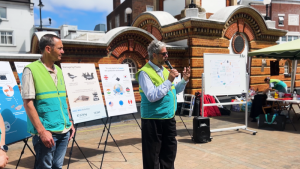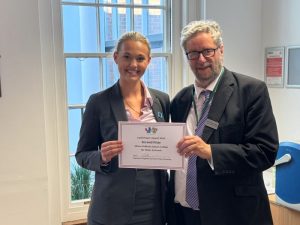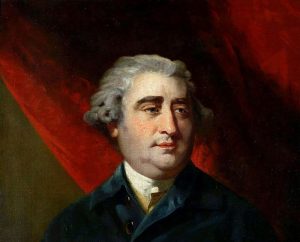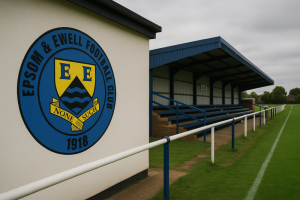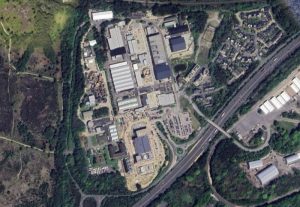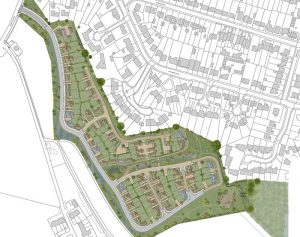By most measures, Epsom & Ewell Football Club should be one of the borough’s proudest institutions. Founded in 1918, steeped in history, and once a beacon of non-league ambition, it’s a club that has worn its local colours with pride for over a century. And yet, in 2024, it plays its home matches outside the borough, in front of modest crowds, with little official support, and almost no recognition from those it nominally represents. How did it come to this?
From Wembley to Nowhere
The club’s golden era came in the mid-1970s. Under manager Bob Smith, Epsom & Ewell reached the FA Vase final at Wembley in 1975, taking more than 10,000 fans to the twin towers. They lost narrowly to Hoddesdon Town, but the day cemented their status in the non-league elite. Just two years later, they were crowned Athenian League champions, playing stylish football and regularly attracting crowds of several hundred to West Street Ground in Ewell.
That ground, tucked between residential streets, was a symbol of grassroots football. A modest stand, small clubhouse, and rickety fence ringed the pitch — but it was home. Children ran the lines as ball boys, pensioners leaned on the barrier rails, and on Saturday afternoons, you could hear the cheers echo down Ewell High Street.
All that changed in 1993. Pressured by rising costs and development interest, the club sold the West Street Ground, and with it, lost its physical and emotional anchor in the borough. The land was sold for housing. Since then, Epsom & Ewell FC has led a nomadic existence, groundsharing with clubs like Banstead Athletic, Merstham, Leatherhead, Chipstead, and currently Corinthian-Casuals in Tolworth — nearly six miles from the borough boundary.
A Club Without a Borough
It is now 31 years since Epsom & Ewell FC played a competitive fixture in Epsom or Ewell. An entire generation has grown up without ever seeing their town represented in senior men’s football. Few children wear the club’s blue and gold; few adults even realise it still exists.
What happened? And more to the point — where was the borough council?
In the three decades since losing West Street, the club has repeatedly tried to secure land for a new stadium within the borough. Sites have been proposed, explored, and rejected. Discussions about Long Grove, Court Recreation Ground, and even sharing facilities with local colleges have all ended in failure. Most recently, informal talks about part of the Horton area being earmarked for community sports development went nowhere.
Supporters point to the contrasting support other councils give their clubs. Sutton United, for instance, receives backing from Sutton Council, which helped secure funding for facilities upgrades when the club was promoted to the Football League. In Epsom, the silence has been deafening. There has been no public plan, no council-led consultation, no transparent effort to bring the borough’s only senior football club back home.
Struggling for Survival
The club is currently playing in the Combined Counties League Division One — the 10th tier of English football. It exists thanks to a dedicated band of volunteers, a threadbare budget, and the goodwill of its landlords. Crowds rarely exceed 60–70. With no clubhouse revenue, limited sponsorship, and minimal visibility, it’s little wonder the club’s financial situation is precarious.
In 2019, the club formally became a Community Interest Company (CIC), a status intended to attract grants and funding by aligning with social benefit goals. While that has helped underpin youth development and safeguarding policies, it hasn’t solved the central issue: without a home, the club cannot grow.
Even now, Epsom & Ewell FC runs youth teams, junior girls’ sessions, and has engaged in local community coaching schemes. But ask any parent at those sessions where the senior men’s team plays, and many will shrug.
The Missed Potential
What’s so frustrating is how easily this could be different. Epsom is one of the largest towns in the South East without a senior football club playing within its boundaries. The borough’s population is over 80,000, and youth football is thriving — the likes of Epsom Eagles and Ewell Saxons run dozens of sides from U7s to U18s. Local talent is not in short supply. But with no flagship club, no clear pathway, and no local stadium to rally around, that energy is scattered.
The irony is that other non-league clubs across Surrey have built strong community models with much less historical pedigree. Why not Epsom?
Councillors have, over the years, said that land availability, planning complexity, and infrastructure costs make a return difficult. That may be true — but where is the political will? Where is the long-term strategic thinking about using sport to promote community health, pride, and youth engagement?
With millions spent on new housing, green infrastructure, and civic regeneration, a modest community stadium with a few hundred seats, changing rooms, and floodlights should not be an insurmountable dream. Yet for 30 years, it has been exactly that.
Do You Care?
This brings us to the title question: Why does no one care about Epsom & Ewell FC?
Maybe it’s because we’ve forgotten how important sport can be to a town’s identity. Maybe because the club’s quiet survival hasn’t shouted loudly enough. Or maybe we just assumed someone else would fix it.
But the truth is, without meaningful public interest — and without council support — Epsom & Ewell FC will remain a ghost club. It will still play fixtures in Tolworth or elsewhere, cheered on by a few die-hards who remember the old days, while the borough it bears in its name carries on, unaware.
It doesn’t have to be this way.
A Special Correspondent
Image – an imagined modest stadium that could be Epsom and Ewell FC’s.


